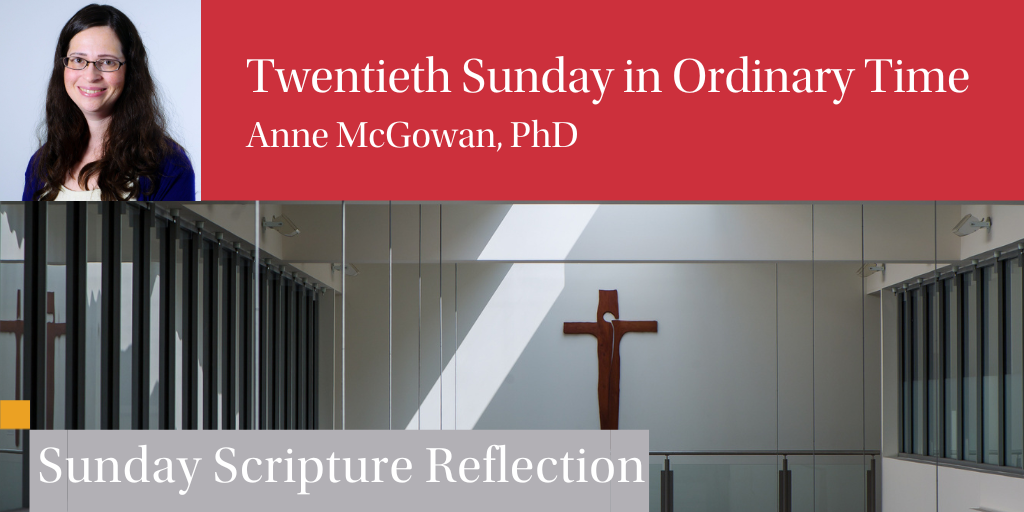
Readings:
Reading I: Jeremiah 38:4-6, 8-10
Psalm: 40: 2, 3, 4, 18
Reading II: Hebrews 12:1-4
Gospel: Luke 12:49-53
Jesus yearned for a blazing world. By many indications, we live in one. Earth’s creatures across the northern hemisphere have been feeling the heat in summer 2022. Numerous regions are also facing fires which can spark so easily in an environment subjected to the short-term effects of heat waves and drought and the longer-term impact of rising temperatures compounded by climate change. Elsewhere, people have been cast like Jeremiah into mud as floodwaters recede. Not sharing Jeremiah’s good fortune, however, to land in a merely muddy cistern, rising rivers and oceans have become for many a pit of destruction in which they perished. Coping with all this while still living meanwhile in the shadow of a global pandemic and its continuing consequences, we might hear the call to “persevere in running the race that lies before us” as marathoners meeting the proverbial wall. With the finish line far from sight and hurdles seemingly running to meet us like in the jump-over-the-obstacle video games my son enjoys, it is tempting to scan our surroundings for some hidden exit to the relentless racetrack rather than keeping our eyes fixed on the incendiary Jesus. Indeed, we can cry with the psalmist, “O my God, hold not back . . . come to my aid!”
“I have come to set the earth on fire,” Jesus says, “and how I wish it were already blazing!” The reason conflagration cannot commence immediately is unpacked in the following verse. “There is a baptism with which I must be baptized, and how great is my anguish until it is accomplished!” Jesus refers here to his impending death (and resurrection) which has now come to pass. For those of us who have been baptized into the death and resurrection of Christ, who live between Pentecost and the Parousia, the implication is that we are enabled to take up the fiery mission of Jesus inaugurated on earth by his death, resurrection, and Ascension. This mission was passed on to the whole Church at Pentecost, courtesy of the Holy Spirit, as portable fire. Flickering flames came to rest on people who could not rest after that until they became blazing beacon-bearers to the ends of the earth. They did not grow weary and lose heart. Through them, the flames of faith were passed in turn, generation by generation, to the ones who eventually passed faith on to us. Every baptism represents one more handoff as the cloud of witnesses running a fiery relay race to the end of time gains another participant. There is one more follower of Jesus, the leader and perfector of faith, of the shared faith of the Church expanding through time and space. This is the Church’s logic when it gives fire to babies – sometimes real babies, sometimes grownups whose struggle against sin drew them to the “sacred surf that swallows age and spits up youth,” as an ancient inscription in the Lateran Baptistery in Rome describes the decisive plunge that divides the unbaptized from the baptized. The youngest Christians can be trusted with fire because it is now their job to carry it with them forever and share it with others. “Enlighted by Christ,” the baptismal rite explains, they are called to “walk always as children of the light” as people who, “persevering in the faith, may run to meet the Lord.” The light of Christ is borne around in bodies for the life of the world.
There is an ember of a reminder here that our call is more to be firebearers and fire-sharers rather than firestarters. The light is Christ’s, faith is God’s gift, and the Spirit sustains the flame and keeps it from flickering out. We cannot kindle this fire for ourselves. We only preserve it with the help of the community as disciples of the firestarting Jesus. Christ did set the earth on fire after all, but whether it keeps blazing big and bright in our times and places depends in large part on whether we are willing to let ourselves be lit up and become blaze builders. While the light of one little candle is not insignificant, blaze building often requires coordinated effort from a community committed to formidable fire. Such fire forces focus. Whether people flee it or flock toward it, they cannot ignore it. Christians might help put out wildfires or soothe family flareups as citizens of earth. But what kind of spiritual fires are we tending and stoking that will warm the weary, offer hope to the faltering, and illuminate divisions in the world that trace back to divine intervention in the form of God’s firestarting Son?
